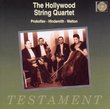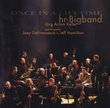| All Artists: Soloman, Kubelik, Philharonia Orchestra Title: Plays Brahms Members Wishing: 0 Total Copies: 0 Label: Testament UK Release Date: 9/13/1994 Genre: Classical Styles: Forms & Genres, Concertos, Historical Periods, Modern, 20th, & 21st Century Number of Discs: 1 SwapaCD Credits: 1 UPC: 749677104122 |
Search - Soloman, Kubelik, Philharonia Orchestra :: Plays Brahms
 | Soloman, Kubelik, Philharonia Orchestra Plays Brahms Genre: Classical
Solomon's cultivated, stylish playing in the First Concerto may lack the fiery thrust of Serkin or Fleisher, yet he surprises you with his menacing trills and effortless octave playing in the first movement. The pianist's ... more » |
Larger Image |
CD DetailsSynopsis
Amazon.com Solomon's cultivated, stylish playing in the First Concerto may lack the fiery thrust of Serkin or Fleisher, yet he surprises you with his menacing trills and effortless octave playing in the first movement. The pianist's stunning Handel Variations, recorded in 1942, shine with bracing rhythmic momentum and cumulative power. --Jed Distler Similar CDs
|
CD ReviewsBrahms: Piano Concerto #1 in D minor with Solomon, pianist Mixture V | La Crescenta, California | 06/17/2003 (5 out of 5 stars) "While this recording is older than many currently available, it is by far the superior one in several respects. First, Kubelik knows how to make an orchestra work and second, Solomon knows how to play the piano in such a way as to be in a class all by himself. No one has really captured the overall grandeur of this magnificent concerto quite the way Solomon has. The first movement has a power of expression rooted in a depth of complete musical control rarely found in any pianist, i.e. tonal beauty and control, dynamics & balance. The second movement in this recording is unsurpassed by any other recording commercially available. Solomon's ability to give tension to a musical phrase by playing the fewest number of notes in the longest span of time is unrivalled and Kubelik is right there with him. For sheer beauty of piano tone at any level of dynamic there is not another pianist like him in the 20th century. The third movement has a fire not often found in the playing of others and the tempo of the fugue is absolutely breathtaking as it rushes forward to the arpeggio on the dominant at the end, an arpeggio which creates a sonority and blend in Solomon's hands unmatched in any other recording. Brahms could not be better served in this concerto than this performance." There can be no such thing as a filler on a disc like this! SwissDave | Switzerland | 01/09/2008 (5 out of 5 stars) "Brahms's 1st is one of my favourites of all piano concertos, and I currently own a dozen or so recordings that I listen to with more or less regularity. In an ideal world, that would be given an equally fine stereo recording, Solomon's from 1955 might share first place with Leon Fleisher's legendary account with Szell from 1958. As it is, Solomon's piano sound comes through in rather splendid mono, but the orchestral tuttis - well, there's just too much going on for the winds to be always heard in perspective etc. (there's a number of orchestral details I'm quite sure I only "get" because I know them from other recordings). I've had the opportunity to listen to this on an all dCS/Spectral system with time- and phase-optimized loudspeakers, and yet, the orchestral detail CANNOT all be heard in proportion at all times. It's unfair in a way, but the truth is, sound quality DOES have a direct influence on what we perceive as the "quality" of an interpretation: as well-balanced as this is for its era, Brahms's 1st may too much for just one microphone (or rather: one channel) to get hold of. Kubelik really does as well as anyone - even so, the recording as a whole doesn't give full justice to the "symphony with piano obligato" character of the work (as a contemporary critic called it). Having said all this, especially those listening with headphones can expect to be very pleasantly surprised.
I love alternative recordings, keeps me from ever getting bored with the composition itself, or believing there's only one way to do it. Solomon plays certain sections in the first movement faster than anyone I've heard, and while it's technically stupendous, it really only sounds different, exhilarating, but neither better nor worse. I like that (individual interpretative touches that make sense, that is). The first movement may be less energetic than Fleisher's, less intellectual than Curzon's (from 1962), less full-bodied than Rubinstein's (1954 with Reiner, his 1964 remake with Leinsdorf is so much in the Fleisher mould, without quite achieving the same tension, as to be almost superfluous - almost, because ultimately, it's such a fine version, too), but it's all Solomon's own, and technical effortlessness is jaw-dropping. The slow movement is one of the most beautiful I've ever heard, perhaps not of a haunting quality like Fleisher's or Rubinstein's (more so with Leinsdorf), more beauty for beauty's sake, so to speak. Solomon, as is so often the case, is a master at creating that self-effacing illusion that the music is allowed to speak for itself. The third movement is again played with impeccable, crystalline clarity. Solomon's Handel Variations from 1942 are NOT a "generous filler"! It is quite simply THE historic benchmark recording of this work (although again, if you own Fleisher's on Sony Masterworks double-CD of the Concertos, the QPR savvy may argue one doesn't need an alternative version of anything there including the fillers). Solomon fingerwork sparkles like a well-polished jewel, and the rythmic quality of the music will make you gently rock in your chair or tap your foot on the floor, according to its various moods. Great, great piano playing, the stuff of legends! The final fugue will leave you panting (for more). Some lacquer noise (the concerto is a tape recording with so little noise it can barely be detected in a work like Brahms's 1st) can be heard, but it is moderate enough it can be ignored. Greetings from Switzerland, David." |

 Track Listings (30) - Disc #1
Track Listings (30) - Disc #1


